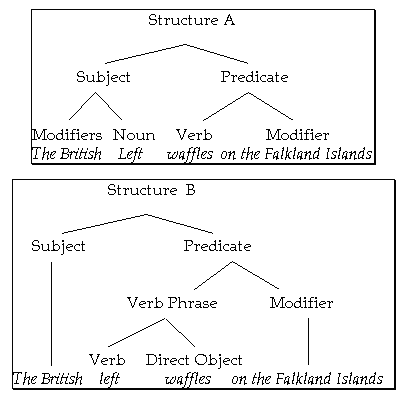You Have to Pay Your Syntax
Do you understand the sentence on the left? How in the world can you do it? The phantom linguist invoked every trick in his bag to mislead you. Clearly speakers (or reader) can perceive things in sentences beyond what they receive. Listening and reading are not passive activities. As your ears receive sentences in your language your mind must actively attack it for its contents. Its weapon: GRAMMAR! But 'grammar' in a different sense. Every sentence is full of ambiguities which you must resolve using your knowlege of sentence structure, word structure, and semantics. For example, what does The British left waffles on the Falkland Islands mean? The political left in England can't make up its mind on the Falklands? Or the mess sargeants didn't clean up after breakfast? The words and their order are the same under either interpretation. What else can there be in a sentence other than words and their order? Plenty.
Intonation, suffixes like the -s on waffle in the sentence above, word order -- all specify grammatical relations between the concepts behind the words in sentences. Our mental dictionary, the list of about 50,000 words we keep in our heads, tells us that left and waffle can either be nouns or verbs.

Looking at the diagrams A and B of the sentence (syntactic 'trees'), we see that the structure we assign to the sentence depends upon whether we decide that British is a noun or an adjective. If we decide that British is an adjective, then left must be the noun it modifies and waffles must be the verb, i.e. [The British left] [waffles on the Falkland Islands (issue)]. Only Structure A is possible. If, on the other hand, we choose The British as our noun phrase, left must be the verb and waffles then must be another noun, the direct object since it comes after the verb, i.e. [The British] [left waffles on the Falkland Islands], and only Structure B is possible. The point is that we must apply knowledge about words and sentence structures which is not present in the sounds in order to interpret such sentences as this one either way. Sentence structure is an invisible but essential part of the mental processing of language.
Syntactic ambiguity is important--and not just for politicians. It is a major component of humor in all languages. For example, did you hear about the child who returned from her first visit to Sunday School and when asked how things had gone, replied that she had learned a dumb song about some cross-eyed bear named "Gladly"? Further questioning brought out the fact that her class has been taught the hymn, "Gladly, the Cross I'd Bear". The unusual word order, perhaps the marginally productive verb to bear led the child to misanalyze the title of the song and assign the phrase the wrong structure, which led to a misperception of what was intended by the song.
Language tells us much about ourselves, not only how we speak but why we laugh. It has been the object of serious research for 4,000 years. The magic word, to repeat, is LINGUISTICS. When it turns to the relations of words in sentences, it is called syntax (which isn't a levy on misbehavior, by the way). The best news is that you can find out much more about it right here at this university. Look up the magic word under 'Modern Languages' if it doesn't have its own listing.
Other Sites Morphology LMBM More Fun Dictionaries Grammars